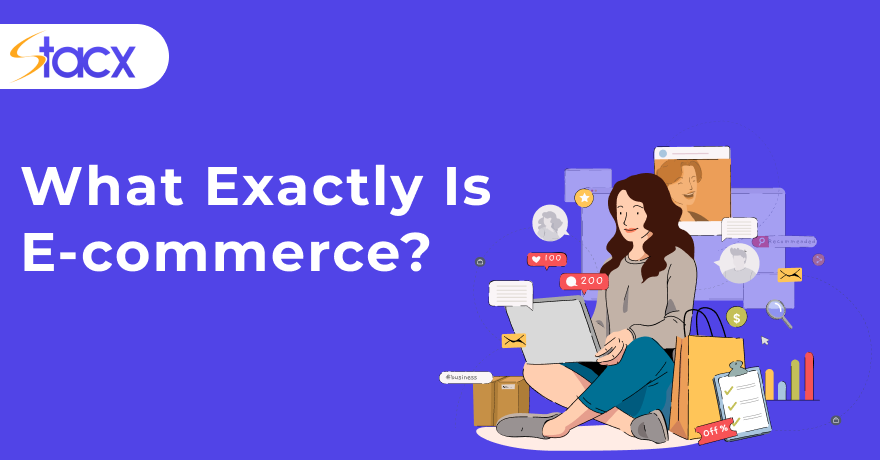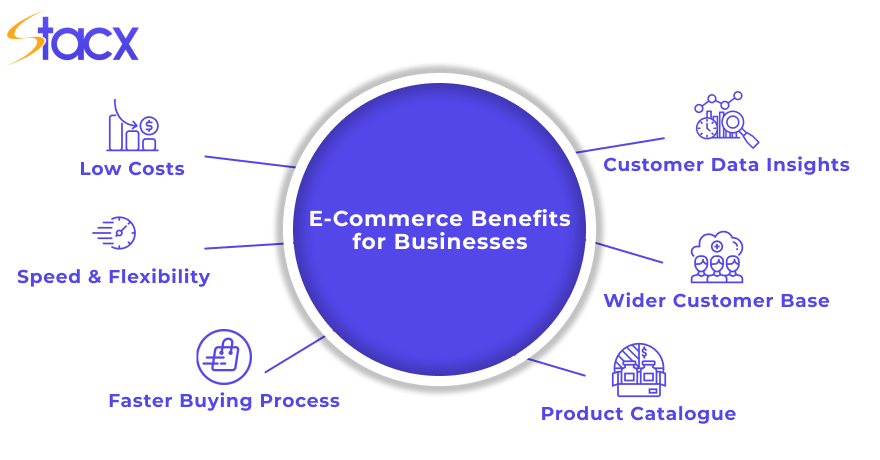In the past two decades, the shopping landscape has undergone a profound transformation, driven by changing consumer preferences. To stay competitive, businesses have had to adapt quickly. One of the most significant shifts has been the surge in online shopping, propelling the rapid expansion of the eCommerce industry. According to Oberlo, eCommerce sales had the potential to account for 20.8% of global retail sales in 2022. It was projected that over 2.3 billion individuals would engage in online purchasing during that year. Considering the world’s population reached approximately 8 billion as of January 2023, this suggests that at least 28% of the global population turned to online shopping for their various requirements.
The United States recognized as one of the largest eCommerce markets globally, recorded a substantial 268 million digital buyers in the year 2022. This impressive figure is projected to experience further growth, approaching nearly 285 million by the year 2025.

Image Source– https://www.statista.com/statistics/273957/number-of-digital-buyers-in-the-united-states/
In the specific domain of retail eCommerce, the United States saw a notable surge in sales during the third quarter of 2022, reaching an impressive $265 billion. This indicates a noteworthy 3% increase compared to the preceding quarter, showcasing the dynamic nature of the eCommerce landscape.
Moreover, the digital era has significantly altered consumer behavior, with a significant 63% of shopping journeys commencing online. This pivotal shift underscores the importance for online retailers to establish their presence in digital marketplaces, capitalizing on this shift in consumer habits to drive revenue growth.
What Exactly Is E-commerce?

E-commerce, short for electronic commerce, encompasses the buying and selling of goods and services online. It’s a versatile platform that caters to a wide range of businesses, from individual sellers and freelancers to medium-sized enterprises and large corporations.
Like any other type of business, there are a large number of benefits of e-commerce for your business that enable companies to thrive in a cutthroat environment.
Many businesses have benefited from online sales in becoming sustainable and successful. It offers enormous opportunities for e-commerce companies that make it convenient for customers to shop online through virtual stores. E-commerce companies of all sizes can reach a larger audience by selling online. E-commerce has its own set of benefits, just like any other type of business. No matter the size, nature, or location of the business, we have dedicated this blog to illuminating the benefits of e-commerce.
Top eCommerce Benefits for Businesses

Do you intend to make an investment in the e-commerce industry? There is good news for you: by 2023, it is predicted that global e-commerce sales will amount to $6.54 US dollars.
Global e-commerce has been growing every year since its inception. Because online shopping is easier and more convenient than shopping in a physical store, more people choose to do so. Examples of how e-commerce is changing and disrupting the market are Amazon and Flipkart.
Even though e-commerce has always been the future, it is now more important than ever. The outside world has changed into a place of uncertainty, caution, and social distance, emphasizing the many benefits of e-commerce for both businesses and consumers.
So, if you want to create an e-commerce website, you need to contact the right e-commerce development service to help you.
Running an eCommerce business offers numerous advantages that can transform the way you operate and expand your reach. Here, we’ve compiled a list of the key advantages that eCommerce helps businesses offer:
1. Low costs

Launching and maintaining a traditional brick-and-mortar store often comes with hefty upfront investments. Expenses such as rent, store design, inventory management, and staff salaries can quickly add up. In contrast, eCommerce businesses can bypass many of these costs when establishing an online presence. The setup time for an eCommerce website is typically shorter, allowing you to start your business more swiftly.
While eCommerce isn’t entirely cost-free, the initial expenses are notably lower. Essential costs include web hosting, eCommerce software, and a domain name, which are relatively affordable. For small-scale operations, you can even manage your eCommerce store independently. Additional expenses may include legal fees (for tax and regulatory compliance) and marketing efforts. Nevertheless, the overall financial burden remains significantly lower than that of a physical store.
2. Speed & Flexibility

An online store can be quickly and easily launched by a person or company. On the other hand, a physical store needs a location, commercial leasing, and enough time for construction and decoration before opening. It takes careful planning, enough time, and plenty of manpower to change displays and product lines in a physical store. It can be done instantly on an e-commerce platform. One important aspect of e-commerce is that it performs far better than traditional retail outlets in terms of speed and versatility. The seller can oversee all activities from the comfort of his home without having to rent office space.
3. Faster Buying Process

Even if a customer only wanted to buy one item, he had to schedule his entire shopping trip in advance. This will involve changing his schedule and going to the store to make the purchase. E-commerce also has the important benefit of speeding up the purchasing process.
There is no longer a need to travel the two to three hours to the outlet from your house. Simply relax while conducting a product search from the convenience of your home or place of employment, then finish placing the order.
Additionally, you can shop whenever you want because online stores are open every day of the week, 24 hours a day. E-commerce makes it convenient for customers to buy a particular product quickly by offering a wide range of options.
4. Product Catalogue

A crucial component of e-commerce is that customers want a thorough overview of the products they want to buy. Customers of an e-commerce platform have access to a product catalog that contains data sheets outlining all of the company’s goods and services.
The specifications, utility, and characteristics are thorough. Even the colors of some products, like cell phones, are specified so you can choose based on personal preference. Customers can learn more information that is not available in retail stores, such as the ingredients in edible items.
Customers can purchase the products they want more easily when knowledge is readily available to them. Online websites also offer reviews and user comments that educate customers about a product’s viability on the market. The portal offers customers warranty details as well as other product-related terms and conditions that may be useful.
5. Wider Customer Base

A physical store is situated in a specific area, and typically, locals can only visit to shop there. The fact that e-commerce stores are not geographically constrained is another benefit.
When conducting business online through e-commerce stores, geographic boundaries become irrelevant. Customers from all over the world who shop online can buy your products. You are not limited to customers who can walk to your physical location. The retail establishment has access to previously untapped niche markets thanks to the Internet. You can reach customers in a number of ways by utilizing various online touchpoints, such as forums and social media.
A customer can use a computer with the necessary operating system and an internet connection to access the portal from anywhere in the world. The online store is accessible to all of its clients around the world twenty-four hours a day, seven days a week. It provides real-time updates on the delivery location and duration of the goods.
6. Customer Data Insights

Gathering valuable data and gaining insights into customer behavior is the foundation of enhancing the customer experience. Online selling offers a significant advantage in tracking and analyzing customer interactions.
Data Analytics Tools: Utilize robust data analytics tools like Google Analytics, KISSmetrics, Crazy Egg, and others to collect and analyze crucial data points. These tools provide insights into customer demographics, including age, gender, location, occupation, interests, and their interactions with your website.
Actionable Reports: Analytics tools generate comprehensive reports that offer actionable insights. These insights enable you to identify areas that need improvement and make data-driven decisions to enhance the user experience.
7. Scalability
Due to a lack of staff, it is extremely challenging to manage a surge in customers in a physical store. A physical store needs more resources and floor space to scale up, and each has a price. In contrast, one of the less obvious benefits of e-commerce for businesses is how simple it is to expand an online store.
All that is needed are more supplies, some digital adjustments, and likely more storage space. This is much less expensive than storefront space. Additionally, since you are already connected to a global marketplace, being online eliminates the need to open a new store in a different location. The right e-commerce development service can provide the best solution you need.
8. Reviews & Ratings

Online retailers encourage their customers to leave reviews so they can learn about customer satisfaction and any problems they encounter when using the goods and services. Potential customers can learn more about the product and decide if it is suitable for their particular needs. Thanks to the reviews that are readily available on e-commerce stores. Additionally, it helps retailers enhance their offerings in order to boost sales and satisfy customers.
We had to rely on our friends who had used the products to provide us with useful information. Because we couldn’t find ratings or reviews of a product in a physical store. Contrarily, a customer can read reviews while relaxing in his own home and make a decision based on his preferences without consulting his friends.
9. Increased Profit Margin

Compared to traditional stores, opening and running an online store is very inexpensive. Additionally, you’ll spend less on marketing, labor, and overhead. The majority of e-commerce sites give the dashboard an added feature for reports and invoices to aid in business financial management. Costs related to inventory management are also decreased when operating an online store.
Online shops can sell goods more quickly and profitably because they are open twenty-four hours a day, seven days a week. An important benefit of an e-commerce platform has proven to be the ability to help businesses increase their profit margins through higher revenues and lower prices.
10. Targeted Marketing

Effective digital marketing allows eCommerce businesses to reach a broader audience while tailoring their efforts to specific customer segments. Understanding your customers’ profiles and preferences is key to this approach.
Customized Product Recommendations: Armed with insights about your customers, you can curate product recommendations that align with their interests. For example, if your eCommerce store sells sports equipment and you want to boost bicycle sales, you can ensure that bike-related ads are displayed primarily to customers actively seeking such products.
11. Reviews & Ratings

Online retailers encourage their customers to leave reviews so they can learn about customer satisfaction and any problems they encounter when using the goods and services. Potential customers can learn more about the product and decide if it is suitable for their particular needs. Thanks to the reviews that are readily available on e-commerce stores. Additionally, it helps retailers enhance their offerings in order to boost sales and satisfy customers.
We had to rely on our friends who had used the products to provide us with useful information. Because we couldn’t find ratings or reviews of a product in a physical store. Contrarily, a customer can read reviews while relaxing in his own home and make a decision based on his preferences without consulting his friends.
12. Streamlined Checkout Process:

Address cart abandonment issues by simplifying your checkout process. Complex checkouts are a common culprit behind abandoned carts. According to Baymard, 24% of US customers abandon their carts because they are asked to create an account, while 18% leave due to the lengthy checkout process.
Consider implementing a streamlined checkout experience, such as a one-page checkout or one-click checkout. These simplified processes have gained popularity among customers, especially mobile shoppers. Platforms like Magento and Bigcommerce offer one-page checkout functionality by default, making it easier for customers to complete their purchases efficiently.
By incorporating these eCommerce strategies into your business model, you can optimize your online presence, boost customer engagement, and reduce cart abandonment rates, ultimately driving growth and success for your eCommerce venture.
Offer Additional Benefits to Customers:
Recognize that customers shop online primarily for convenience. Enhance the customer experience by offering extra benefits of e-commerce to a business such as:
Free Shipping: Many customers appreciate free shipping options, which can significantly influence their decision to complete a purchase.
Limited-Time Offers: Create a sense of urgency with limited-time offers and promotions, encouraging customers to make a purchase sooner rather than later.
Clear Return and Refund Policies: Transparency in return and refund policies instills confidence in customers, reducing cart abandonment rates. A survey revealed that 49% of US customers abandoned their carts due to high extra costs, including unclear return policies.
Types of eCommerce Business Models
E-commerce, or electronic commerce, has evolved into a vast and diverse industry with various business models. These models cater to different types of products, services, and customer preferences. Here are some of the most common types of e-commerce business models:
B2C (Business to Consumer):
- In this model, businesses sell products or services directly to individual consumers.
- Examples: Amazon, Walmart, Zappos.
B2B (Business to Business):
- Businesses sell products or services to other businesses.
- Examples: Alibaba, Salesforce, and Shopify (for business owners).
C2C (Consumer to Consumer):
- Individuals sell products or services directly to other individuals through online marketplaces.
- Examples: eBay, Craigslist, Poshmark.
C2B (Consumer to Business):
- Individuals offer products or services to businesses.
- Examples: Freelance platforms like Upwork, Fiverr, and influencer marketing platforms.
D2C (Direct to Consumer):
- Brands and manufacturers sell their products directly to consumers, bypassing traditional retail channels.
- Examples: Warby Parker, Dollar Shave Club, Casper.
Subscription Model:
- Businesses charge customers on a recurring basis for access to products or services.
- Examples: Netflix (video streaming), Spotify (music streaming), and Blue Apron (meal kit delivery).
Marketplace:
- An online platform that connects multiple sellers with potential buyers.
- Examples: Etsy (handmade and vintage items), Airbnb (accommodations), and Uber (rides).
Dropshipping:
- Retailers don’t keep products in stock. Instead, they partner with suppliers who ship products directly to customers.
- Examples: Oberlo, SaleHoo, AliExpress.
Wholesale and Manufacturing:
- Businesses sell products in bulk to other businesses or retailers.
- Examples: Alibaba (wholesale), and Boeing (manufacturing).
Crowdfunding:
- Entrepreneurs and creators raise funds for their projects or ideas by soliciting contributions from a large number of people, often through crowdfunding platforms.
- Examples: Kickstarter, Indiegogo, GoFundMe.
Social Commerce:
- The integration of e-commerce and social media platforms, where users can buy products directly from social media posts or ads.
- Examples: Instagram Shopping, Facebook Marketplace.
Rental and Sharing Economy:
- Businesses allow customers to rent or share products or services temporarily.
- Examples: Airbnb (short-term accommodations), Zipcar (car sharing), and Rent the Runway (clothing rental).
Digital Products and Services:
- Businesses sell digital goods or services, such as software, e-books, online courses, and digital downloads.
- Examples: Adobe Creative Cloud, Coursera, and App Store.
Brick-and-Click:
- Traditional brick-and-mortar retailers expand their operations by selling products online in addition to their physical stores.
- Examples: Walmart, Best Buy, Target.
Affiliate Marketing:
- Marketers promote products or services on behalf of other businesses and earn a commission for each sale or lead generated through their referrals.
- Examples: Amazon Associates, ClickBank, ShareASale.
These are just some of the diverse e-commerce business models that cater to a wide range of consumer needs and preferences. The choice of a specific model depends on factors such as the type of products or services offered, target audience, and business goals.
Tips for Starting an Online Business:
As you embark on your eCommerce journey, consider these practical tips to set yourself up for success:
Choose the Right Platform:
Selecting the appropriate eCommerce platform is one of your initial and critical decisions. Your chosen platform should empower your website’s performance, engagement capabilities, and scalability. Popular platforms like Magento, Shopify, and WooCommerce offer a range of plans tailored to different business types and needs.
Highlight Your Products:
In the online shopping landscape, customers cannot physically touch or handle products, which can be a drawback. To bridge this gap, leverage multimedia elements such as images and videos to showcase your products comprehensively. Beyond visuals, include essential product details like materials, sources, sizes, colors, ingredients, and any other pertinent information on your product pages.
By focusing on customer insights, targeted marketing, and these practical tips, you can create a thriving eCommerce business that not only meets customer expectations but also drives growth and customer loyalty.
Effective eCommerce Strategies for Success
To achieve success in the competitive eCommerce landscape, consider implementing these proven strategies:
Omnichannel Marketing:

Reach out to your customers through omnichannel marketing to create a consistent and engaging brand experience. For instance, if a customer signs up with their email, adds items to their cart but leaves without completing the purchase, you can employ an omnichannel approach. Send them an email reminder about the abandoned products, encouraging them to return and complete the transaction.
Research indicates that omnichannel marketing becomes most effective when you utilize three or more marketing channels. Marketers who employ this approach have achieved remarkable results, with engagement rates reaching 18.96%, compared to just 5.4% for those using a single channel. Moreover, campaigns that leverage three or more channels boast a staggering 250% higher purchase rate.
Regular Data Monitoring:
Make data tracking and analytics a routine part of your eCommerce strategy. Depending on the type of data, you should check it regularly, whether on a daily, weekly, or monthly basis. Consistent data monitoring is vital for staying informed about your business’s performance and making informed decisions.
Wrap Up
It’s worth noting that the rise of eCommerce doesn’t imply the imminent disappearance of brick-and-mortar businesses. Traditional retailers can leverage eCommerce to adopt a hybrid strategy that combines online and in-store shopping experiences. When executed effectively, this hybrid approach can yield substantial benefits of using e-commerce for both consumers and businesses.
The shift toward online entrepreneurship offers a multitude of advantages, making it an attractive choice for aspiring business owners. However, success in the eCommerce space requires diligence, strategic planning, and an ongoing commitment to learning and adaptation. Moreover, traditional businesses can also thrive by integrating eCommerce into their operations, demonstrating that coexistence and synergy between online and physical retail are possible and rewarding strategies.



Recent Comments